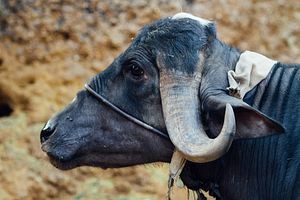On July 11, in the Una municipality of the Gir Somnath area in Gujarat, four members of a Dalit caste family were thrashed by a vigilante mob. They were removing the carcass of a dead cow when the attackers, who were self-proclaimed ‘gau rakshaks’ or cow protectors, launched upon them. The men were tied to an SUV then stripped and beaten with iron rods for allegedly killing the cow whose carcass they were attempting to dispose of. A video of this attack was uploaded online by one of the attackers as a warning to anyone who wished to slaughter a cow. The video went viral and sparked outrage from Dalit groups – beginning on July 12 and expanding state-wide within a week.
There are two dimensions important to understanding the implications of this incident – the first is the caste that the victims belonged to and the second is the reason they were flogged. Dalit caste groups have historically faced discrimination and continue to do so across the country despite regulations attempting to prevent the same. Deep-seated prejudices against members of this group result in outbreaks of violence against them, often supported by other members of the caste groups which instigate it.
This incident, in terms of its violence, is one of many that occur on a daily basis against Dalits, but is particularly inflammatory because it was sparked off merely by a family that was attempting to do its job. Disposal of carcasses is often viewed socially as ‘unclean’ and thus traditionally solely relegated to members of lower castes. On the one hand, the men were attempting to complete work assigned to them, but on the other the very same task thrust upon them, resulted in the attack.
The question of the dead cow itself is important to this case. Gujarat is a state that has imposed a complete ban on the slaughter of cows. When the investigation into this attack began, policemen also allegedly looked into the reasons behind the death of the cow, ultimately finding it to have been natural.
This is not the first instance of a mob acting out against a group of people accused of killing a cow. Last year, in the state of Uttar Pradesh, a 52-year-old man was killed by a mob, and his son was seriously injured, when crowds nearby heard that they had been consuming beef. The mob attacked after finding meat in their refrigerator and refusing to believe that it was not beef. The family in that case was Muslim, and all the members present at the household were attacked, as were neighbors who tried to stop the violence.
The incident, which similarly sparked outrage, brought up important questions regarding the Modi government’s commitment to protecting cows – on grounds that they are sacred animals in India. While some Hindu caste communities entirely refrain from consuming beef (even if they consume other forms of meat) this is by no means universal. Some Dalit communities have always included beef in their diets, as have other non-Hindu communities. The incident was highlighted as symptomatic of the Modi government’s extremely straitjacketed notion of what constituted tradition and sacrality in India.
The recent Una incident set off one of the largest Dalit uprisings the state of Gujarat has hitherto seen. On July 18, seven young Dalit men attempted suicide by consuming pesticide, in protest of the delay in delivering justice to the family and the state’s tolerance of such atrocities. One of the men was Congress party member Anil Madhad. On the next day, more suicide protesters joined the fray, and one died. Protests erupted across the region of Saurashtra and a National Highway connecting the cities of Rajkot and Porbander was blocked by the demonstrators.
State transport buses were set on fire and pelted by angry mobs; in a couple of districts truckloads of cow carcasses were dumped outside the district collector’s office with declarations that none would be buried until action was taken against the attackers. Dalits across political lines, from both the Congress and the Bharatiya Janata Party (BJP), united to join the protest and the ‘Dalit Swabhiman Andolan,’ a temporary federation for those unaffiliated to a party was formed. A group known as ‘Dalit Panthers’ called for a strike across the state mid-last week.
The state Chief Minister Anandiben Patel was jolted into action as the protests escalated. The state agreed to bear the costs of treatment and offered compensation of about $15,000 to each injured person. A specially designated court for speedy trial of this case was set up – with a promise that a chargesheet would be filed within sixty days. Four policemen have been suspended on grounds of negligence concerning this case and nine attackers (including members of right wing group Shiv Sena) have been arrested.
This case has also created furor in the parliament with opposition parties losing no opportunity to point fingers at what the Congress called the BJP’s “failure to protect the rights of such communities.” Prominent political leaders have met with the family of the injured, whose head, Balu Sarvaiya, has expressed fear at the possibility of continuing this occupation. Even the Rashtriya Swayamsevak Sangh (RSS) a prominent right wing group, closely associated with the BJP, has spoken out condemning the incident.
With all political factions rushing to condemn this incident and with the BJP scrambling to appease the angry protestors, calls have been made to increase the compensation provided and also strongly clamp down against such flowering cow-protection vigilante groups. As the crowds show no signs of letting up, the government’s hand is being forced – this time they will have to make significant moves towards procuring justice for victims of a scarily and rapidly growing movement to protect a misplaced notion of tradition.
































